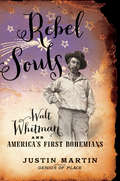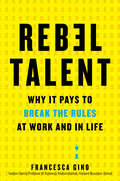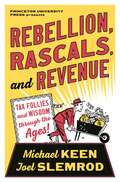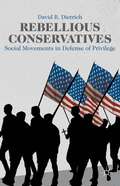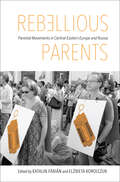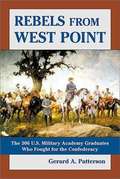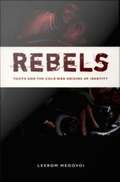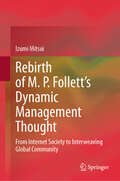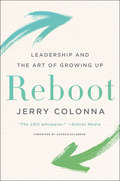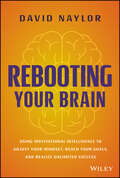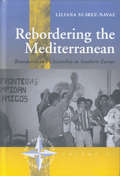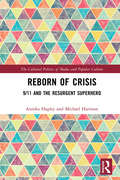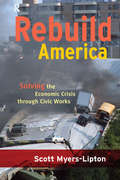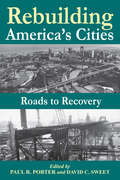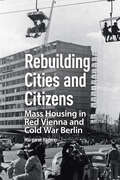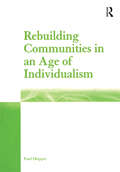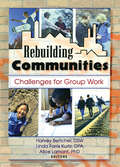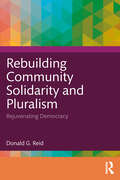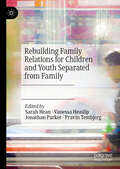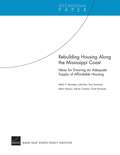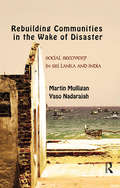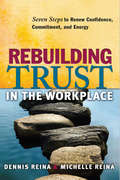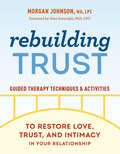- Table View
- List View
Rebel Rulers: Insurgent Governance and Civilian Life during War
by Zachariah Cherian MampillyRebel groups are often portrayed as predators, their leaders little more than warlords. In conflicts large and small, however, insurgents frequently take and hold territory, establishing sophisticated systems of governance that deliver extensive public services to civilians under their control. From police and courts, schools, hospitals, and taxation systems to more symbolic expressions such as official flags and anthems, some rebels are able to appropriate functions of the modern state, often to great effect in generating civilian compliance. Other insurgent organizations struggle to provide even the most basic services and suffer from the local unrest and international condemnation that result.Rebel Rulers is informed by Zachariah Cherian Mampilly's extensive fieldwork in rebel-controlled areas. Focusing on three insurgent organizations-the Liberation Tigers of Tamil Eelam (LTTE) in Sri Lanka, the Rally for Congolese Democracy (RCD) in Congo, and the Sudan People's Liberation Movement/Army (SPLM/A) in Sudan-Mampilly's comparative analysis shows that rebel leaders design governance systems in response to pressures from three main sources. They must take into consideration the needs of local civilians, who can challenge rebel rule in various ways. They must deal with internal factions that threaten their control. And they must respond to the transnational actors that operate in most contemporary conflict zones. The development of insurgent governments can benefit civilians even as they enable rebels to assert control over their newly attained and sometimes chaotic territories.
Rebel Souls: Walt Whitman and America's First Bohemians (A Merloyd Lawrence Book)
by Justin MartinIn the shadow of the Civil War, a circle of radicals in a rowdy saloon changed American society and helped set Walt Whitman on the path to poetic immortality.<P><P> Rebel Souls is the first book ever written about the colorful group of artists-- regulars at Pfaff's Saloon in Manhattan--rightly considered America's original Bohemians. Besides a young Whitman, the circle included actor Edwin Booth; trailblazing stand-up comic Artemus Ward; psychedelic drug pioneer and author Fitz Hugh Ludlow; and brazen performer Adah Menken, famous for her Naked Lady routine. Central to their times, the artists managed to forge connections with Ralph Waldo Emerson, Mark Twain, and even Abraham Lincoln. This vibrant tale, packed with original research, offers the pleasures of a great group biography like The Banquet Years or The Metaphysical Club. Justin Martin shows how this first bohemian culture--imported from Paris to a dingy Broadway saloon--seeded and nurtured an American tradition of rebel art that thrives to this day.
Rebel Talent: Why It Pays to Break the Rules at Work and in Life
by Francesca Gino<P>The world’s best chef. <br>An airline captain who brought his flight to safety in a daring water landing. <br>A magician known for his sensational escape acts. <P>A computer scientist who founded a world-renowned animation studio. What do all of these people have in common? <P> They love their jobs, they break the rules, and the world is better off for it. They are rebels. <P>From an early age, we are taught to be rule followers, and the pressure to fit in only increases as we age. But conformity comes at a steep price for our careers and personal lives. When we mindlessly accept rules and norms rather than questioning and constructively rebelling against them, we ultimately end up stuck and unfulfilled. As leaders, we are less effective and respected. As employees, we are more likely to be overlooked for top assignments and promotions. As partners and friends, we are checked out and unhappy. <P>Francesca Gino has been studying rebels in life and in the workplace for more than 15 years. She has discovered that rebels—those who practice “positive deviance” at work-- are harder to manage, but they are good for the bottom line: their passion, drive, curiosity, and creativity raise the entire organization to a new level. And she has found that at home, rebels are more engaged partners, parents, and friends. <P><P>Packed with strategies for embracing rebellion at work and in life, and illuminating case studies ranging from the world of fine dining to fast food chains to corporations such as Google and Pixar, Rebel Talent encourages all of us to rebel against what’s comfortable, so that we can thrive.
Rebellion, Rascals, and Revenue: Tax Follies and Wisdom through the Ages
by Michael Keen Joel SlemrodAn engaging and enlightening account of taxation told through lively, dramatic, and sometimes ludicrous stories drawn from around the world and across the agesGovernments have always struggled to tax in ways that are effective and tolerably fair. Sometimes they fail grotesquely, as when, in 1898, the British ignited a rebellion in Sierra Leone by imposing a tax on huts—and, in repressing it, ended up burning the very huts they intended to tax. Sometimes they succeed astonishingly, as when, in eighteenth-century Britain, a cut in the tax on tea massively increased revenue. In this entertaining book, two leading authorities on taxation, Michael Keen and Joel Slemrod, provide a fascinating and informative tour through these and many other episodes in tax history, both preposterous and dramatic—from the plundering described by Herodotus and an Incan tax payable in lice to the (misremembered) Boston Tea Party and the scandals of the Panama Papers. Along the way, readers meet a colorful cast of tax rascals, and even a few tax heroes.While it is hard to fathom the inspiration behind such taxes as one on ships that tended to make them sink, Keen and Slemrod show that yesterday’s tax systems have more in common with ours than we may think. Georgian England’s window tax now seems quaint, but was an ingenious way of judging wealth unobtrusively. And Tsar Peter the Great’s tax on beards aimed to induce the nobility to shave, much like today’s carbon taxes aim to slow global warming.Rebellion, Rascals, and Revenue is a surprising and one-of-a-kind account of how history illuminates the perennial challenges and timeless principles of taxation—and how the past holds clues to solving the tax problems of today.
Rebellious Conservatives
by David R. DietrichConservative social movements such as the Tea Party are having a huge impact on American politics and social life. Unlike social movements of the past, these conservative protesters are not oppressed minorities but tend to be relatively privileged population groups. So why are they protesting? Rebellious Conservatives examines three conservative movements, the anti-abortion/pro-life movement, the anti-illegal immigration movement, and the Tea Party, to determine why conservatives engagein protest, how they justify such action, and how they seek to reshape America. Drawing upon aspects of social movement and race theory, the author shows how perceived threats to the privileges of these conservatives drives their protest, how these movements have attempted to reshape American identities to protect these privileges, and the potential implications of the success of these movements.
Rebellious Parents: Parental Movements in Central-Eastern Europe and Russia
by Fábián, Katalin; Bekiesza-Korolczuk, ElbietaParental activism movements are strengthening around the world and often spark tense personal and political debate. With an emphasis on Russia and Central and Eastern Europe, this collection analyzes formal organizations as well as informal networks and online platforms which mobilize parents to advocate for change on a grassroots level. In doing so, the work collected here explores the interactions between the politics, everyday life, and social activism of mothers and fathers. From fathers' rights movements to natural childbirth to vaccination debates, these essays provide new insight into the identities and strategies applied by these movements as they confront local ideals of gender and family with global ideologies.
Rebels From West Point
by Gerard A. PattersonThis is the Story of the Confederate officers who graduated from West Point and later joined the Confederate army. It tells of their characters, their actions, and all that their choice to leave the Union lost them.
Rebels: Youth and the Cold War Origins of Identity
by Leerom MedovoiHolden Caulfield, the beat writers, Elvis Presley, Chuck Berry, and James Dean--these and other avatars of youthful rebellion were much more than entertainment. As Leerom Medovoi shows, they were often embraced and hotly debated at the dawn of the Cold War era because they stood for dissent and defiance at a time when the ideological production of the United States as leader of the "free world" required emancipatory figures who could represent America's geopolitical claims. Medovoi argues that the "bad boy" became a guarantor of the country's anti-authoritarian, democratic self-image: a kindred spirit to the freedom-seeking nations of the rapidly decolonizing third world and a counterpoint to the repressive conformity attributed to both the Soviet Union abroad and America's burgeoning suburbs at home. Alongside the young rebel, the contemporary concept of identity emerged in the 1950s. It was in that decade that "identity" was first used to define collective selves in the politicized manner that is recognizable today: in terms such as "national identity" and "racial identity. " Medovoi traces the rapid absorption of identity themes across many facets of postwar American culture, including beat literature, the young adult novel, the Hollywood teen film, early rock 'n' roll, black drama, and "bad girl" narratives. He demonstrates that youth culture especially began to exhibit telltale motifs of teen, racial, sexual, gender, and generational revolt that would burst into political prominence during the ensuing decades, bequeathing to the progressive wing of contemporary American political culture a potent but ambiguous legacy of identity politics.
Rebirth of M. P. Follett’s Dynamic Management Thought: From Internet Society to Interweaving Global Community
by Izumi MitsuiThe purpose of this book is to reevaluate the dynamic management thought of M. P. Follett (1868–1933) and recreate it for the construction of a new society after the COVID-19 era. Here, the focus is especially on the main concept of her dynamic social process concept, &“interweaving&”, and showing its current applicability. It should also be noted that the time Follett created this concept was when the 1918 pandemic (&“Spanish flu&”) struck Boston. Based on her academic background in political science, philosophy, history, psychology, and related disciplines, Follett had many years of practical experience as a social worker in Boston and advocated a social view based on the dynamic interaction of individuals. It included &“rebuilding social relations&”, &“social development as a continuous process&”, and &“creating a community experience through the interweaving of individual experiences&”. One of the important issues that COVID-19 poses is the breaking and restructuring of human relations in communities and societies. The author believes that such an issue could be easily resolved by information and communications technology (ICT) networks. While it is a powerful tool, we are now aware that it also has the effect of isolating individuals and inciting conflicts. The author applies Follett&’s ideas to approach such problems. In this book, her perspectives on the &“interweaving process of experience&” and its position are emphasized as important concepts for creating new communities for the post-COVID-19 era. Expressed symbolically, they correspond to interweaving experiences in the internet society.
Reboot: Leadership and the Art of Growing Up
by Jerry ColonnaOne of the start-up world’s most in-demand executive coaches—hailed as the “CEO Whisperer” (Gimlet Media)—reveals why radical self-inquiry is critical to professional success and healthy relationships in all realms of life.Jerry Colonna helps start-up CEOs make peace with their demons, the psychological habits and behavioral patterns that have helped them to succeed—molding them into highly accomplished individuals—yet have been detrimental to their relationships and ultimate well-being. Now, this venture capitalist turned executive coach shares his unusual yet highly effective blend of Buddhism, Jungian therapy, and entrepreneurial straight talk to help leaders overcome their own psychological traumas. Reboot is a journey of radical self-inquiry, helping you to reset your life by sorting through the emotional baggage that is holding you back professionally, and even more important, in your relationships.Jerry has taught CEOs and their top teams to realize their potential by using the raw material of their lives to find meaning, to build healthy interpersonal bonds, and to become more compassionate and bold leaders. In Reboot, he inspires everyone to hold themselves responsible for their choices and for the possibility of truly achieving their dreams.Work does not have to destroy us. Work can be the way in which we achieve our fullest self, Jerry firmly believes. What we need, sometimes, is a chance to reset our goals and to reconnect with our deepest selves and with each other. Reboot moves and empowers us to begin this journey.
Rebooting Your Brain: Using Motivational Intelligence to Adjust Your Mindset, Reach Your Goals, and Realize Unlimited Success
by David NaylorLearn—and teach others—to embrace change and collaboration In Rebooting Your Brain: Using Motivational Intelligence to Adjust Your Mindset, Reach Your Goals, and Realize Unlimited Success, leadership development and sales expert, David Naylor delivers an incisive exploration of why people struggle and how to escape the shackles that hold individuals and organizations back. Leveraging the latest insights of cognitive psychology, neuroscience, and evolutionary biology, the book presents an easy to leverage framework that allows people to understand the exact steps necessary to let go the limiting beliefs and perspectives that create unhappiness, dissatisfaction and mediocrity. Relying on the author’s unique and effective 2logical motivational intelligence-based solutions, readers will discover how to build greater success in both their career and personal life. Readers will also find: Explorations of what holds people back and how to remove those obstacles Strategies for promoting and encouraging accountability, open-mindedness, listening, reflection, engagement, and drive Techniques for reducing or eliminating risk aversion, closed-mindedness, negative attitudes, fear and instant gratification biasAn essential and practical book perfect for team leaders, managers, executives, directors, and other business leaders, Rebooting Your Brain is the evidence- and cognitive science-based resource that leaders everywhere have been waiting for.
Rebordering The Mediterranean
by Liliana Suajrez-NavazOffering a rich ethnographic account, this book traces the historical processes by which Andalusians experienced the shift from being poor emigrants to northern Europe to becoming privileged citizens of the southern borderland of the European Union, a region where thousands of African immigrants have come in search of a better life. It draws on extended ethnographic fieldwork in Granada and Senegal, exploring the shifting, complementary and yet antagonistic relations between Spaniards and African immigrants in the Andalusian agrarian work place. The author's findings challenge the assumption of fixed national, cultural, and socioeconomic boundaries vis-à-vis outside migration in core countries, showing how legal and cultural identities of Andalusians are constructed together with that of immigrants.
Reborn of Crisis: 9/11 and the Resurgent Superhero (The Cultural Politics of Media and Popular Culture)
by Michael Harrison Annika HagleyThis book examines the dominant popular culture convention of the superhero, situated within the most significant global event of the last 20 years. Exploring the explosion of the superhero genre post-9/11, it sheds fresh light on the manner in which American society has processed and continues to process the trauma from the terrorist attacks. Beginning with the development of Batman in comics, television, and film, the authors offer studies of popular films including Iron Man, Captain America, The X-Men, Black Panther, and Wonder Woman, revealing the ways in which these texts meditate upon the events and aftermath of 9/11 and challenge the dominant hyper-patriotic narrative that emerged in response to the attacks. A study of the superhero genre’s capacity to unpack complex global interplays that question America’s foreign policy actions and the white, militarized masculinity that has characterized major discourses following 9/11, this volume explores the engagement of superhero films with issues of authority, patriotism, war, morals, race, gender, surveillance, the military industrial complex, and American political and social identities. As such, it will appeal to scholars and students of cultural and media studies, film studies, sociology, politics, and American studies.
Rebuild America: Solving the Economic Crisis Through Civic Works
by Scott Myers-LiptonIn Obama's America public works is once again a part of the national dialogue. Today it is offered as a solution to the economic downturn and to the public infrastructure crisis. This timely book examines the reasons for the economic crisis facing Main Street, and connects them to why the nation has structurally deficient bridges, weak levees, poorly maintained dams, and dilapidated schools. The book goes on to analyse the history of US public works, updating lessons from the New Deal, to understand the most effective way to organise a modern US civic works project, based on a civic works pilot project for the Gulf Coast. One chapter features new contributions by Howard Zinn, Angela Glover Blackwell, and other leading scholars and thinkers weighing in on how an US civic works project might solve our economic, infrastructure, and environmental crises.
Rebuilding America's Cities
by PAUL R. PORTER, DAVID C. SWEETA growing cooperation between the public and private sectors indicates that the tasks of redevelopment are too large and complex for either sector to accomplish alone. Some people maintain that government can do few things right; others are equally distrustful of the private sector. As used here, the private sector is considered to be all that is not government. Each of the success stories illustrated is, in part, a ""road to recovery,"" although none appear to have been influenced by a purpose that broad.Paul R. Porter and David C. Sweet present stories of progress in self-reliance that concern neighborhood and downtown recoveries, school improvement, job generation, a regained fiscal solvency, novel financing techniques, helping tenants to become homeowners, and a successful venture in self-help and tenant management in crime-infested neighborhoods. The successes stem from the diverse community roles of Yale University, a medical center, the world's largest research organization, the Clorox Company, a gas company, an insurance company, a newspaper, neighborhood and downtown organizations, city governments and two religious organizations - the Mormon Church and the tiny Church of the Savior.These stories are located throughout the United States, including Akron, Baltimore, Brooklyn, Cincinnati, Cleveland, Columbus, Fort Wayne, Indianapolis, Milwaukee, New Haven, Oakland, Pittsburgh, St. Louis, St. Paul, Salt Lake City, Springfield, Mass., Tampa, and Washington, D.C. The editors have gathered the work of professionals known in the field of urban studies: James W. Rouse, Donald E. Lasater, Rolf Goetze, Dale F. Bertsch, Joel Lieske, Eugene H. Methvin, James E. Kunde, T. Michael Smith, Robert Mier, Carol Davidow, Jay Chatterjee, June Manning Thomas, Norman Krumholz, Larry C. Ledebur, and Robert C. Holland.
Rebuilding Asia Following Natural Disasters
by R. Michael Feener Daly, Patrick and Feener, R. Michael Patrick DalyProviding a detailed and comparative assessment of the humanitarian responses to a series of major disasters in Asia over the past two decades, including massive earthquakes, volcanic eruptions, and tsunamis, this book explores complex and changing understandings and practices of relief, recovery, and reconstruction. These critical investigations raise questions about the position and responsibilities of a growing range of stakeholders, and provide in-depth explorations of the ways in which local communities are transformed on multiple levels - not only by the impact of disaster events, but also by the experiences of rebuilding. This timely volume highlights how the experiences of Asia can contribute towards post-disaster responses globally, to safeguard future communities and reduce vulnerabilities. This is a valuable resource for academic researchers interested in post-disaster transformations and development studies, practitioners in NGOs, and government officials dealing with disaster response and disaster risk reduction.
Rebuilding Cities and Citizens: Mass Housing in Red Vienna and Cold War Berlin
by Margaret HadererIn Vienna after WWI and Berlin after WWII, the provision of mass housing not only was a response to a dire social need but also served as a key lever for building variants of socialism and liberalism. Zooming into the interplay between political ideologies and the production of space, this book shows that ideologies, understood as political beliefs that underpin everyday life, are never simply ‘written’ into space but that their meaning is made and re-made, negotiated and contested, and sometimes cunningly subverted in and through space. How people live was – and continues to be – a profoundly political question that involves negotiations of, and decisions on, norms and ideals of citizenship, freedom, equality, property, democracy, gender, and family life – negotiations and decisions that come with legacies that shape the present.
Rebuilding Communities in an Age of Individualism
by Paul HopperAs modern societies become increasingly individualistic, this fascinating book examines how we can maintain and revive local communities and community life. It demonstrates how the major developments and processes of our time, notably globalization, post-industrialism and de-traditionalization, contribute to this individualism to the detriment of community life. The author examines how community is a necessary and important component of human life and discusses possible ways in which to arrest its decline. In this regard, strategies geared to fostering trust and social capital are outlined as the basis for reinvigorating community life. The volume provides a coherent and distinct analysis of community as well as offering concrete policy prescriptions to counter the excessive individualism of our times. In both the nature and scope of its analysis, it offers a unique contribution to an extremely important issue in the contemporary period, one that increasingly preoccupies politicians, academics and ordinary citizens.
Rebuilding Communities: Challenges for Group Work
by Harvey Bertcher Alice E Lamont Linda Farris KurtzRebuilding Communities: Challenges for Group Work is a collection of research and information presented at the 18th Annual Symposium of the Association for the Advancement of Social Work with Groups. Social workers, students, educators, and practitioners will examine how group work can improve multicultural relations within the community. Through your use of the valuable suggestions in this book, you will discover new ways to help the poor in your community help themselves, while giving them a sense of power and self-esteem to help them battle racism, sexism, and shrinking economic opportunities. Through Rebuilding Communities, you will also discover a formula for global group work that will help you make a difference by applying your hometown skills to the global community. This valuable book discusses the need for you to combine energy with humility, offer assistance with the ability to listen, to intervene when necessary, and to comprehend diversity for successful and beneficial group programs. This informative guide brings to light the skills and values needed for effective group work and how combining knowledge-base and practice-base will assist you in making a positive impact on your community. With this important book, you will find a rich source of current thinking about group work practice in relation to women, violence, health problems, child welfare, and other areas, as well as group work theory to help you find the best way to help the various people of your community. Rebuilding Communities will provide you with specific ways to improve your group work skills and positively affect the individuals in your community, such as: learning that your role of caring and advocacy as a group worker must be a complete and lifelong commitment and that you must be prepared to use your skills throughout your everyday life to make a difference using the World Wide Web to form groups whose members can support one another through the anger, joy, pain, and challenges of life learning how group work can help calm the stormy transitions that adolescent immigrants face by helping them relate to other children who are in similar circumstances examining how parents of pediatric urology patients find solace through groups where they can address such sensitive issues as the future of sexual functioning and fertility for their children discovering how marathon group sessions in South Africa are helping to provide basic services to the disadvantaged with programs to facilitate interracial contact and understanding among women and programs for adolescents boys in foster careRebuilding Communities offers you a deeper understanding of the total positive effect that group work can have on various sectors of your community to help you provide better services to those in need. This unique book focuses your attention on the importance of group work to community development and even provides you with a glimpse into the future of group work. With Rebuilding Communities you will discover a multifaceted approach to solving problems that communities face to help you choose the best options for your own community and give the best possible services to the people you assist.
Rebuilding Community Solidarity and Pluralism: Rejuvenating Democracy
by Donald G. ReidThis book critiques the traditional practice of community organization, change and development, and concludes that the present practice of Community Development (CD) and Social Policy and Planning (SP&P) is no longer capable of meeting the current challenges at the local or national level. The aim of this book is to identify the underlying motivations for the individual aggressive and collective antisocial behaviour that we witness in democratic society today and offer changes to the orientation of the current community change practice in order to build a system that can better address the present needs of society.This work identifies the factors that are moving society toward extremism and authoritarianism focusing particularly on the community level. Given the turmoil in communities that is degrading democracy and leading to authoritarianism today, the issues of Community Solidarity and Pluralism (CS&P) must be attended to before the traditional political, economic, and material issues that are regularly addressed by CD and SP&P practice can become the focus for change and development once again. This book will have widespread appeal to academics, researchers, and postgraduate students throughout the social sciences including sociology, social work, political science, economics, philosophy, environmental studies, and international and community development studies. It is also intended for the general reader who is interested in understanding the authoritarian forces that are attempting to infiltrate the democratic process.
Rebuilding Family Relations for Children and Youth Separated from Family
by Jonathan Parker Vanessa Heaslip Sarah Hean Pravin TembjergThis edited volume explores a range of causes for separation of children and young people from family, the impact of these causes, and methods that both professionals and families may employ to build or rebuild these relations. In particular, contributions focus on six high priority crises through which children and young people become either permanently or temporarily separated from their families: removal by child welfare services, migration, family breakdown, placement into institutional care, incarceration and/or the death of a parent. Authors emphasize the feelings of grief and loss experienced both by the child and their family whatever the separation context and the eventual impact on the young person ´s mental health. They conclude that reunification with the family is not always possible or desirable and permanent alternative sources of care and/or attachment may be required. But if reunification is possible, it is a complex and a multidimensional pathway as children move from one care context to the next. Innovation, coproduction with the birth family and tackling stigma and discrimination associated with family separations, is a high priority.
Rebuilding Housing Along the Mississippi Coast
by Mark A. Bernstein Paul Sorensen Mark Hanson Julie Kim Adrian OvertonIn October 2005, RAND researchers went to Mississippi to help the Governor's Commission on Recovery, Rebuilding, and Renewal and the Affordable Housing Subcommittee of the Infrastructure Issues Committee. They identified policy and implementation options that could help local communities address affordable-housing issues. They considered challenges in providing affordable housing and strategies for dealing with those challenges.
Rebuilding Local Communities in the Wake of Disaster: Social Recovery in Sri Lanka and India
by Martin Mulligan Yaso NadarajahThis book examines the sociological consequences of disaster relief and recovery, and uncovers its impact on the communities that were affected by the Indian Ocean tsunami in 2004. It is the most extensive and intensive study of post-disaster community rebuilding yet reported in the literature on the subject. The authors draw on this research to develop a three-phase strategy for moving from quick and effective relief to long-term social recovery work. While there have been many big natural disasters since then, none have affected so many local communities spread over so many nations and none have evoked the same kind of global response. A great deal of post-tsunami recovery work was done in India and Sri Lanka, with more than 500 international aid and humanitarian agencies involved in Sri Lanka alone – many with little experience in long-term community development. This book argues that international aid agencies must work patiently to put in place meaningful partnerships with local, community-based organisations as soon as long-term physical and social planning becomes possible. The authors explain that such an approach could help address some pre-existing vulnerabilities in disaster-affected communities. They argue that it is much easier to rebuild damaged infrastructure than to rebuild shattered lives, and to ensure that traumatised communities are not put under new stresses and strains, the ‘fault-lines’ within these communities need to be lessened.
Rebuilding Trust in the Workplace: Seven Steps to Renew Confidence, Commitment, and Energy
by Dennis S. Reina Michelle L. ReinaAre you feeling less engaged, less committed and more skeptical at work? Do you find yourself isolated? Or are you caught in the middle of co-workers’ interpersonal conflicts? If so, you may be experiencing the symptoms of broken trust in workplace relationships. Small but hurtful situations accumulate over time into the confidence-busting, commitment-breaking, energy-draining patterns consistent with broken trust. Broken trust is simply the natural outcome of people interacting with one another. Everyone has experienced gossiping, missed deadlines, someone taking credit for other people’s work and “little white lies.” You may have been hurt. You may have realized that you inadvertently let others down. Or, you may be wondering how to help others reeling from broken trust. No matter your vantage point, Dennis Reina and Michelle Reina’s new book offers a proven seven-step process to heal pain and rebuild trust. This compassionate, practical approach will help you reframe the experience, take responsibility, forgive, let go and move on. Through healing, you will want to go to work again. You will feel safe to be more fully “who” you are and, once again give your organization your best thinking, highest intention, risk-taking and creativity. And in a place of self-discovery, self-trust and authenticity, you will connect more fully with others in your personal life as well. While there have been many books on recovering from betrayal in personal relationships, this is the first book to focus specifically on the workplace, and the first to give equal weight to what to do when you have hurt others. It is firmly grounded in the Reinas’ 20 years of rigorous research on trust and the empathy they have developed from supporting thousands of people on their healing journeys.
Rebuilding Trust: Guided Therapy Techniques and Activities to Restore Love, Trust, and Intimacy in Your Relationship
by Morgan JohnsonRepair, heal, and restore your relationship with evidence-based therapy skills, techniques, and activities from a respected trust-recovery specialist.Of all the ways relationships fall apart, betrayal can rock us to the core. And yet, for couples or partners who want to stay together and do the work, healing is possible. The old relationships that no longer serve us can be dismantled and reassembled into deeper, stronger, more satisfying bonds than we ever imagined. Rebuilding Trust features: • A guided approach to healing after betrayal whether from sexual infidelity and emotional affairs or hidden addictions and patterns of disrespect• Step-by-step exercises and skill-building activities to help partners work together as they restore trust in themselves and each other• Trusted therapy-based strategies and techniques from Gottman Method Couples Therapy, Emotionally Focused Couple Therapy (EFT), Imago Relationship Therapy, and other evidence-based approaches • Journaling prompts, conversation starters, and sample scripts to facilitate emotional processing and relational healing• An inclusive, nonjudgmental view of relationship dynamics, making this book appropriate for couples and relationships of all types

